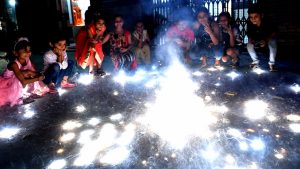 NewDelhi: Delhi remained under the grip of dust and firecracker pollution post-Diwali, as per Air Quality Index (AQI) data. The pollution levels in Delhi and Uttar Pradesh`s Noida dipped to `very poor` category with overall air quality index standing at 306 and 356, respectively. The celebrations saw people bursting crackers to mark the occasion.
NewDelhi: Delhi remained under the grip of dust and firecracker pollution post-Diwali, as per Air Quality Index (AQI) data. The pollution levels in Delhi and Uttar Pradesh`s Noida dipped to `very poor` category with overall air quality index standing at 306 and 356, respectively. The celebrations saw people bursting crackers to mark the occasion.
Post-Diwali, the AQI in Lodhi road was docking at 306, which falls in the `very poor` category. The major pollutants PM 2.5 and PM 10 were at 257 and 249 respectively in Mathura road area. An AQI between 0 and 50 is considered `good`, 51 and 100 `satisfactory`, 101 and 200 `moderate`, 201 and 300 `poor`, 301 and 400 `very poor`, and 401 and 500 `severe`.
With an aim to curb the menace of dust and firecracker pollution, the East Delhi Municipal Corporation (EDMC) on Monday began sprinkling water on the roads in Laxmi Nagar area. The local authorities were seen running the machines in and around Laxmi Nagar, which is a popular shopping area in the national capital.
Extremely poor air quality in Delhi was earlier predicted due to firecracker emissions, unfavourable weather and a significant spike in stubble burning in neighbouring states.
However, locals in Mumbai could breath easy with major pollutants PM 2.5 and PM 10 docking at 32 and 43 respectively in Haji Ali area — levels which come in the `good` category, as per AQI data.
Haryana too witnessed bursting of crackers on Diwali, its AQI stood at 279 (poor) at NISE Gwal Pahari area in Gurugram. On Saturday, the System of Air Quality and Weather Forecasting And Research (SAFAR) had predicted that the air quality will get even worse in coming days and the AQI was expected to be around 324 due to Diwali.
In the wake of the increased pollution, Delhi residents have complained of a spike in respiratory problems and allergies. Stubble burning in Punjab and Haryana makes the situation in Delhi worse. According to Punjab Remote Sensing Centre (PRSC), straw burning has increased this year. To curb air pollution, the Arvind Kejriwal-led government in Delhi has announced the implementation of the Odd-Even scheme from November 4 to 15, stating that smog from nearby states due to the burning of crop residue is one of the major causes of pollution in the region.
Bureau Report
Leave a Reply